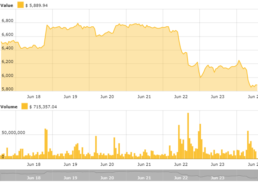What the Korea's Crypto Scene Is Saying about Exchange hacks
The Korean cryptocurrency community speaks out about the recent exchange hacks
Author: Christine Kim / Source: CoinDesk
The past two weeks have seen two South Korean exchanges get attacked and robbed, sparking commentary and critique among the country's local cryptocurrency community.
It began with the Coinrail hack on June 9. At the time, the popular South Korean cryptocurrency exchange tentatively announced a "cyber intrusion" that saw the loss of $40 million worth of cryptocurrencies.
The exact number and amount of tokens taken from the exchange have yet to be confirmed by the company itself, though a third-party firm assisting Coinrail gave a few estimates in a blog post the following day.
If that wasn't enough, on June 20, Bithumb – South Korea's largest by trade volume – also announced a major security breach in which $31 million was reported to be lost. In a post published on their official website the same day, Bithumb reassured customers that their assets were now securely stored in offline "cold" wallets unreachable to hackers and the stolen funds would be fully reimbursed.
Combine this environment with a recent bearish market trend taking the price of bitcoin down in a way not seen since 2014 and you get the kind of social media uproar that questions just about everything.
As one Korean cryptocurrency skeptic tweeted:

"Anyone would look at this and see it as an insider act, no? Please catch the culprit and restore the platform back to the original state as soon as possible…You said there is no vulnerability of being hacking in an advertisement. Are you joking me right now?"

Digging Deep
For most, it's not a matter of tech security – that's a given for those that care – but rather about the people who operate the exchanges behind the scenes.
As @leejongsul78 puts it:

Peering Through the #FUD About #Crypto
Bitcoin has thrust cryptocurrencies into mainstream consciousness by shaking up the financial world in the past 9 years.
Author: Gareth Jenkinson / Source: Cointelegraph
Since its inception in 2009, the preeminent cryptocurrency has thrown a spanner in the works of traditional banking and financial institutions and has paved the way for the creation of a plethora of industry-shaping virtual currencies and blockchain-based innovations.
With that being said, it’s been far from smooth sailing for Bitcoin or any other cryptocurrency. Dramatic highs and soul-shattering lows have been part and parcel of the past nine years.
The volatility of cryptocurrencies has created more than a few detractors and we’ve seen a number of headlines exclaiming the ‘death’ of Bitcoin and cryptocurrencies in general.
These obituaries have come from a wide variety of industry experts and commentators. While they’re almost always subjective, they portray a negative, fear-mongering mentality that detracts from the technological breakthroughs that have been sparked by blockchain technology.
Let’s take a look at some of the instances that have led to mainstream media outlets signaling the death of Bitcoin and examine where the industry is at midway through 2018.

It’s not difficult to find articles slamming Bitcoin and cryptocurrencies — just look at 99bitcoins.com, which has a compendium of Bitcoin obituaries that has now surpassed the 300 mark.
The earliest headline heralding the end of Bitcoin, according to the website, is an article entitled ‘Why Bitcoin can’t be a currency’ published in a blog entitled The Underground Economist in 2010. In essence, the writer pointed to Bitcoin’s constantly fluctuating value as the main reason why it shouldn’t be considered a currency.
“While Bitcoin has managed to bootstrap itself on a limited scale, it lacks any mechanism for dealing with fluctuations in demand. Increasing demand for Bitcoin will cause prices in terms of Bitcoin to drop (deflation), while decreasing demand will cause them to rise (inflation).”
Since then, the number of headlines suggesting that Bitcoin was doomed to fail has increased year on year. In 2017, there were a total of 118 Bitcoin obituaries articles.
These obituaries are any articles that predict the demise of Bitcoin, based on assumptions or quotes from a wide range of commentators. This includes mentions of fraud, ponzi schemes and money laundering and frankly anything that is negative enough to cast aspersions on the future of Bitcoin.
While the sheer number of articles that have predicted the death of Bitcoin may be humorous, a glance down the list of headlines from various publications tells a different story altogether.
Small scale blogs like the one that is credited for the first Bitcoin death article have a limited reach and aren’t likely to have a profound effect on the sentiment of a large group of people.
However, as the number of these articles increases, so too has the caliber and profile of the publications producing this content.

Mainstream mania
CNBC has covered cryptocurrencies extensively over the last few years, with content that is fairly objective in terms widespread coverage of both positive and negative sentiments towards the industry,
With that being said, CNBC has been the source of numerous interviews quoting various sources that have labelled Bitcoin a bubble and ponzi scheme, while speculating on how it would crash.
The most telling example of this was JPMorgan CEO Jamie Dimon comparing Bitcoin to the Dutch Tulip Mania before predicting it would blow up on CNBC. Perhaps more telling was the effect Dimon’s statements had on Bitcoin’s value, which fell after the American executive’s comments:
"It's worse than tulip bulbs. It won't end well. Someone is going to get killed. Currencies have legal support. It will blow up."
In November 2017, Bloomberg published an article that speculated on a number of different factors that could potentially derail Bitcoin as it headed to that $20,000 high in December.
The article quoted several sources that point to the number of altcoins, regulations, cyber attacks and the launch of derivatives as pitfalls to Bitcoin’s rise in price and popularity.
Bubble talk
The Guardian published an editorial in November 2017 that labelled Bitcoin’s price as a bubble, and pointed to the costs of mining, slammed the endorsements by celebrities and made strong statements about Bitcoin’s primary use as means to buy drugs and pay ransoms online.
Forbes contributor Jay Adkisson wrote an op-ed which went on to describe the way Bitcoin is currently sold as a scam. The writer boiled down Bitcoin to a core existence as a number, without an intrinsic value.
He went on to suggest that cryptocurrencies lack ‘uniqueness,’ pointing to the sheer number of cryptocurrencies in existence.
The Telegraph also published a number of articles last year, drumming up ‘bubble’ rhetoric as the 2017 wound to a close. Abhishek Parajuli took a mighty swipe in his own op-ed on the platform, citing wild volatility, poor utility as a medium exchange as well as slow transaction speeds:
“So, hype aside, Bitcoins are lottery tickets. They have no underlying utility. When the music stops, those left holding them will be burned.”
Wall Street Journal contributor James Mackintosh weighed in on the value of Bitcoin in mid-September 2017. In essence, the writer delved into the notion of Bitcoin having become digital gold as a store of value.
Going on...
Are Privacy Coins ‘One of the Greatest Emerging Threats to U.S. National Security?'
What will the future hold for the crypto worlds privacy coins with Congress looking at possibly regulating them. Is it even possible?
Author: Adam James / Source: Bitcoinist.com
The U.S. Secret Service is taking a good look at privacy-focused cryptocurrencies like Monero and Zcash while urging Congress to “consider additional legislative or regulatory actions.”
Fear of Privacy Coins
Last week, a top official from the federal law enforcement agency reportedly requested help from Congress in combating the use of privacy coins for illicit purposes. Robert Novy, Deputy Assistant Director of the Secret Service’s Office of Investigations, wrote:
We should … consider additional legislative or regulatory actions to address potential challenges related to anonymity-enhanced cryptocurrencies.
He added, as reported by Forbes:
[C]ontinued Congressional attention is warranted to ensure law enforcement agencies maintain lawful access to critical sources of evidence, regardless of where, or in what form, that information is stored.
Greg Nevano, an official in the investigations division of the Immigration and Customs Enforcement, backed up Novy’s opinion, stating:
Some newer cryptocurrencies have features that make the tracing of them quite complicated. These new anonymity-enhanced cryptocurrencies are clearly ripe for illicit use in an effort to subvert...
Current Bear Trend ‘By No Means’ Funeral for Bitcoin says CNBC’s Brian Kelly
Key insights on the Bitcoin markets and trading from Brian Kelley.
Author: Helen Partz / Source: Cointelegraph
The current bear market is not a funeral for Bitcoin (BTC) “whatsoever,” CEO of BKCM LLC investment firm Brian Kelly said on CNBC's Fast Money segment June 22.
We tried to have a funeral for #Bitcoin as it fell below $6K, but @BKBrianKelly is still a believer. Here's why he thinks the cryptocurrency will resurrect pic.twitter.com/B8ozbzPsfJ
— CNBC's Fast Money (@CNBCFastMoney) June 22, 2018
To back up his statement, Kelly provided three key factors. First, he pointed out that the market sentiment is “approaching lows,” implying that a trend reversal is likely to follow.
Bitcoin, trading at $5,881 as of press time, has been in an almost continuous decline since hitting its all-time-high of $20,000 in December 2017.
Asia’s Influence on the Cryptocurrency Markets
Asia is one of the leading influencers in the crypto markets and trading volume.
Author: Kaia / Source: CoinStaker | Bitcoin News

Nowadays cryptocurrencies like Bitcoin and Ethereum are considered widely to be real investment vehicles, with the future goal being mass adoption. This is slowly progressing within the US and Europe, but some areas of Asia, particularly in the Southeast region have really started to embrace this revolution. Cryptocurrency is being used in many ways such as Bitcoin Cash beer gardens in Thailand and blockchain based microlending programmes in Cambodia.
Until midway through 2017 China was regarded as the biggest market worldwide for Bitcoin trading, however from September onwards this began to change when ICOs were banned and then government officials shut down some local Bitcoin exchanges, such as OKcoin and Huobi, which were two of the largest in the world and this then made Japan the largest Bitcoin market in the world. It is only set to get worse for China too as now their Government Officials also want to crack down even further on Bitcoin mining and stop local internet access to cryptocurrency exchanges internationally. This would stop any potential Chinese Bitcoin consumers buying from foreign exchanges as well as their own.
Asia’s Influence is undeniable
It has been noticed that cryptocurrency trading in Asia has proved to be very adaptable, in particular in relation to the wide ranging prices across the continent. The chief exec of a Hong...
EOS 1st, BTC 17th in China's Latest Government Crypto Rankings
The 2nd China government-backed cryptocurrency rankings were released.
Author: Marie Huillet / Source: Cointelegraph

The second round of China’s state-backed monthly ratings of cryptocurrencies and blockchain projects has been released, Cena News reported June 21.
Dubbed the “Global Public Chain Technology Evaluation Index,” this latest round was announced at the Shanghai Science Hall on June 20, and ranks EOS 1st, Ethereum (ETH) 2nd, and Bitcoin (BTC) 17th, out of a total of 30 analyzed cryptocurrencies.
China’s monthly “Global Public Chain Technology Evaluation Index” is published by the China Center for Information Industry Development (CCID) of the Ministry of Industry and Information Technology, and is said to be compiled by “first-rate domestic experts and scholars,” according to the original Index press release.
EOS’ top ranking is attributed to the “outstanding technical advantages in transaction confirmation efficiency, network throughput, and transaction costs” of the protocol.
While conceding the EOS...
Fintech Chamber in Uruguay to Propose Crypto Regulations
Author: Stefan Filipović / Source: thetokener.com

TheTokener recently reported about the hardships South America’s crypto community is facing. This region of the world is desperately seeking for certain regulations. There will be a lot of potential for Fintech companies and crypto-related businesses in South America as people are beginning to realize new opportunities that might arise from these innovations. In the midst of confusing banks and governments actions towards crypto space, Uruguay might bring new regulations that could serve as a spark for other countries to regulate their crypto space, creating one fully regulated crypto market consisting of all South American countries.
New Uruguay Regulations
As BNamericas reports, fintech chamber in Uruguay is about to form a special committee which will have a task to propose certain cryptocurrency regulations in the country. This committee should work with the authorities in the area of laws in order to find the best solution for growing crypto community.
Sebastian Olivera, Uruguay fintech chamber founder, and their former president stated that new cryptocurrency drafts will need to pass through established institutional channels. Olivera also said that they realize that there cannot be any activity developed outside of the reach of the regulatory sphere, especially regarding...
‘A Moral Hazard’: Bank of Korea Opposes Central Bank Digital Currency
Source: CCN

The Bank of Korea (BoK) has revealed it is against the idea of issuing a central bank digital currency following a feasibility review.
South Korea’s central bank isn’t keen on issuing a central bank digital currency (CBDC) citing concerns related to its impact on the basic mechanics of monetary policy and implementation as well as the bank’s influence on open market operations, a report released on Monday revealed.
As reported by the Korea Times, the BoK is also concerned about costs related to issuing a digital currency alongside the potential ‘moral hazard’ it could cause. Pointedly, BoK researcher Kwon Oh-ik at the central bank’s economic research institute argued that a central bank digital currency would ‘destabilize the market order’ by claiming digital currencies do not function as money.
The researcher said in the report:
We reviewed the possible feasibility of digital currencies as currency; however, our thoughts are that digital currencies have been exposed to various categories of risk associated with credit, liquidity...
Bitcoin Gold Hit by Double Spend Cyber Attack
Source: CCN

Join our community of 10 000 traders on Hacked.com for just $39 per month.
A malicious miner successfully executed a double spend attack on the Bitcoin Gold network last week, making BTG at least the third altcoin to succumb to a network attack during that timespan.
Bitcoin Gold director of communications Edward Iskra first warned users about the attack on May 18, explaining that a malicious miner was using the exploit to steal funds from cryptocurrency exchanges.
To execute the attack, the miner acquired at least 51 percent of the network’s total hashpower, which provided them with temporary control of the blockchain. Obtaining this much hashpower is incredibly expensive — even on a smaller network like bitcoin gold — but it can be monetized by using it in tandem with a double spend attack.
After gaining control of the network, the attacker began depositing BTG at cryptocurrency exchanges while also attempting to send those same coins to a wallet under their control. Ordinarily, the blockchain would resolve this by including only the first transaction in the block, but the attacker was able to reverse transactions since they had majority control...
Huobi Pro Launches New Crypto Market Index
Author: Wolfie Zhao / Source: CoinDesk
Cryptocurrency exchange Huobi Pro is launching a new market index for its customers, the company announced Wednesday.
The Huobi main force index will track 10 different digital assets traded against tether (USDT), a dollar-pegged cryptocurrency, on its platform in real time, according to a press release.
The index will "reflect the overall performance of Huobi Pro market," allowing investors to see a single aggregated feed rather than having to check on individual assets one at a time.
The index will use weighted samples, according to the press release, which explained that the index divides digital assets into four categories: digital asset, platform, application and real asset substitute (not included in the...











